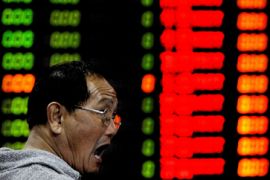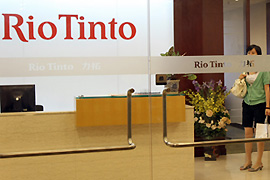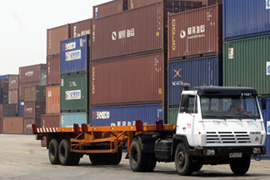Can China save the world economy?
Danny Schechter says Beijing’s expansion in Africa and Latin America is costly, but smart.

 |
| Chinese exports and manufacturing have been hit hard by the global economic recession [AFP] |
The death of Mao Zedong, the Chinese communist leader, and the disappearance of his little Red Book, does not mean that two popular quotations do not live on in the minds of China’s people.
The first, by Mao himself, is an axiom that every journalist and politician would be wise to embrace: “No investigation, no right to speak.”
The second is from his successor, Deng Xiaoping, who in many ways replaced Marxism-Leninism with Market-Leninism, justifying the transition from state-dominated socialism to state-guided capitalism.
Like Mao, he was cryptic when he famously explained: “It does not matter if a cat is black or white, so long as it catches mice.”
| special report | |
Your Views: Is China buying the world? |
Yet when we apply Mao’s admonition to investigate to the direction Deng drove China, we find an often puzzling example of another Chinese contribution to world thought: the concept of contradictions.
The mice Deng alluded to were the prospects of economic stability and growth, goals that had eluded China in its years of imperial invasions, wars and revolution.
Today, the world recognises that the American Century is being, or has been, supplanted by the Chinese century as what was once “the Middle Kingdom” emerges as an economic superpower.
The Economist, a magazine considered to be the voice of modern capitalism, recently praised China for the most astonishing economic transformation in human history.
Continued growth
While there is some debate about the validity of Chinese growth statistics, Beijing’s tendency to paper over its many structural problems – like unemployment and poverty (or growing dissent) – cannot rule out that China has continued to grow while many Western economies have all but collapsed and now live off government life-support.
China’s leaders, however, are not sanguine. They may talk tough in their criticisms of US hegemony but they continue to partner with Wall Street and prop up the ballooning US debt.
Their caution is clear in their fiscal and monetary policies, however.
Wen Jiabao, China’s premier, indicated in early August that it was unlikely there would be a shift in policy – a position welcomed by the US, which had feared that Beijing might bail out of its reliance on the US dollar.
“We are persisting with implementing active fiscal policies and appropriately relaxed monetary policies because we still face many hardships and challenges. The international economic outlook remains unclear, and pressure from falling external demand remains heavy,” Wen said, according to the government’s official website.
“The impetus for self-sustaining growth in the economy is still not strong … therefore, the direction of macro-economic policy cannot change.”
Chinese concerns
 |
| China claims it was defrauded out of $1bn by the Rio Tinto company [AFP] |
But the English translation of Wen’s words does not fully reflect China’s own worries.
The East Asia Forum reported that Chinese financial institutions, especially large banks and insurance companies, lost hundreds of billions of dollars during the current financial crisis.
More importantly, China’s State Administration of Foreign Exchange (SAFE), invested at least 60 per cent of its $1.8tn foreign reserves in US dollar assets and, therefore, already incurs far greater losses, at least on the books.
China recently claimed that the Rio Tinto company defrauded it of nearly $1bn.
The damage might have been greater had China not maintained strict controls, with the state owning majority stakes in financial institutions. For 30 years, the Chinese system seems to have been more stable than our own after its own reform and opening policy.
Blaming the US
Yet China does not live in a world of its own and is menaced itself by the consequences of a financial crisis it had little to do with other than in helping to stabilise a US system which is now unravelling.
It is taking a big hit in exports and manufacturing.
No wonder many unemployed workers in China blame the US for not fully regulating its system and permitting deepening inequality and white collar crime to run amok in the name of an engineered prosperity.
As the chickens come home to roost, businesses are collapsing along with financial markets.
In China, the impact is severe. Hu Jintao, the Chinese president, had been working to ease imbalances in China but he and the leadership understand, as The Guardian reports, lower growth during the world economic slowdown will mean less demand for Chinese exports.
“The growth rate of the world economy has slowed down noticeably. There are more uncertain and volatile factors in the international economic climate,” Li Xiaochao, of China’s National Bureau of Statistics, said.
“All these factors have started to release their negative impact on China’s economy,” he said.
An old doctrine
 |
| China fears that its exports may drop because of the global financial crisis [REUTERS] |
So China has not escaped the crisis in part because of the way globalisation connects us all in an interlocking web of trade.
China’s response has been in part to diversify from the East-West axis to a North-South one.
China’s expansion into deals and a hunt for resources in Africa and Latin America – often going to regions the West has abandoned – is costly but smart.
In many ways this reflects an old doctrine that goes back to the Chinese Revolution, when the later-discredited military General Lin Piao advised surrounding the enemy rather than engaging directly.
China now has its own multi-national strategy that is global in scope.
Beijing realises that Wall Street itself is not an answer – nor are protectionist policies going to bring outsourced jobs back.
There are some in the West advocating that the West emulate China’s policies – rather than oppose them – by applying more state intervention and even tougher justice against corporate criminals.
Adopting Chinese policies?
I was surprised when Bill Maher, a well-known TV comedian, seriously urged the White House to adopt the Chinese government’s more punitive approach to Wall Street corruption and wrongdoing – execute serious wrongdoers.
As the international economy unravels further, we have to stay focused on those that are really responsible and not fly off into specious conspiracies.
China knows that today there are big rats out there as well as mice and cats.
If no investigation, no right to speak is not applied, the wrong cats will not catch the right mice.
Danny Schechter, Mediachannel’s “News Dissector,” has reported from China, and is currently writing a book and making a film on the global financial crisis as a crime story.
The views expressed in the above column are the author’s own and do not necessarily reflect Al Jazeera’s editorial policy.
